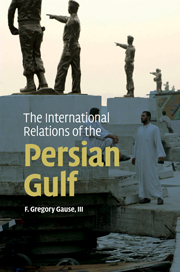Book contents
- Frontmatter
- Contents
- List of maps and tables
- Acknowledgments
- Note on the text and bibliography
- 1 The Persian Gulf as a security region
- 2 The emergence of the Gulf regional system, 1971–1978
- 3 The Iranian Revolution and the Iran–Iraq War
- 4 The Gulf War and the 1990s
- 5 9/11, the Iraq War and the future of the Persian Gulf
- 6 The Iraq War: American decision-making
- 7 Conclusions: war and alliance in the Persian Gulf
- Index
- References
5 - 9/11, the Iraq War and the future of the Persian Gulf
Published online by Cambridge University Press: 05 June 2014
- Frontmatter
- Contents
- List of maps and tables
- Acknowledgments
- Note on the text and bibliography
- 1 The Persian Gulf as a security region
- 2 The emergence of the Gulf regional system, 1971–1978
- 3 The Iranian Revolution and the Iran–Iraq War
- 4 The Gulf War and the 1990s
- 5 9/11, the Iraq War and the future of the Persian Gulf
- 6 The Iraq War: American decision-making
- 7 Conclusions: war and alliance in the Persian Gulf
- Index
- References
Summary
The 9/11 plot was hatched in Afghanistan and implemented in the United States, but both its origins and its repercussions were centered directly in the Persian Gulf. Usama bin Laden is a Saudi and his animus toward the United States originated largely, though not completely, in his opposition to American policy in the Gulf. Fifteen of the nineteen 9/11 hijackers were Saudis and two were from the UAE. Saudi Arabia was the source not only of the personnel who carried out the attacks, but also of much of the ideological fervor and many of the logistical networks that underlay the growth of the salafi jihadist movement in the 1980s and 1990s. The attacks led to the most serious crisis in the Saudi–American relationship since the 1973–74 oil embargo. The American invasion of Iraq also stemmed directly from the attacks. Absent the shock of 9/11, it would not have been possible for the Iraq war hawks in the Bush administration to carry the day, either within the administration, in Congress or in American public opinion. The Iraq War and the subsequent American occupation of Iraq dramatically changed the power realities of the Gulf. While Iraq remains profoundly unsettled, the outlines of a new regional power configuration were forming by the end of 2008. That new configuration, however, is hardly what the Bush administration imagined it might be in the heady days after the fall of Saddam's regime in 2003.
- Type
- Chapter
- Information
- The International Relations of the Persian Gulf , pp. 136 - 183Publisher: Cambridge University PressPrint publication year: 2009



